There are many different types of notes that make up our lives. Notes can include: good old-fashioned sticky notes, to-do lists past their due dates plastered around bedroom walls, moments of inspiration and movie recommendations we commit to remembering logged in our iPhone notes, shopping lists scribbled on the back of crumpled receipts, text messages shared between friends as comforting updates to get us through the workday, Tweets or Instagram stories, sharpie obscenities on the back of club toilet doors, graffiti, tags and random messages we read on walls as we rush through our days - the list is infinite.
I’m still articulating and understanding what counts as a note and what notes mean to me, but some of the reasons I’m pro notes include:
I feel a unique joy when finding someone else’s written notes, analysis or personal messages scrolled inside a pre-loved book from the library or a secondhand shop. Borrowing a book from a friend who has left notes and annotations in the margins feels like an act of co-reading and by extension, bonding.
I am interested in diary writing/letter writing/journaling as both undervalued forms of writing and their own versions of note-taking.
Since the majority of our written communication today is digitaI, I see a surplus of value in hand-written notes between friends, lovers or even strangers.
I am interested in note-taking in the sense of unravelling e.g. non-linear, messy, doodles, scribbles, mind maps and incomplete sentences scrappily jotted down in an attempt to make sense of our thoughts.
I think notes have the potential to become unofficial archives of specific historic moments that transcend places and generations.
I like the idea of notes being perfectly okay as they are - without having to be adapted, embellished or expanded into something more polished or complete.
Feminist Duration Reading Group: Notes
Earlier this year, I went to a feminist reading group on the topic of ‘Notes’. The aim of the reading group was to think through note-taking as a critical, creative form. The description of the reading group posed the following questions:
What is the status of the note? What encounters and exchanges happen in and through the note? How do notes move thinking, and how do they open it up in times of impasse and weighted silences? How do notes transcend, cross, sneak and borrow?
The ‘status of the note’ is one of low significance; notes are not commonly credited as a literary genre or as sites of knowledge. However, we can learn and gain something unique from notes because they often consist of a more raw (or simply different) language than, for example, a highly edited and well thought-through essay or novel.
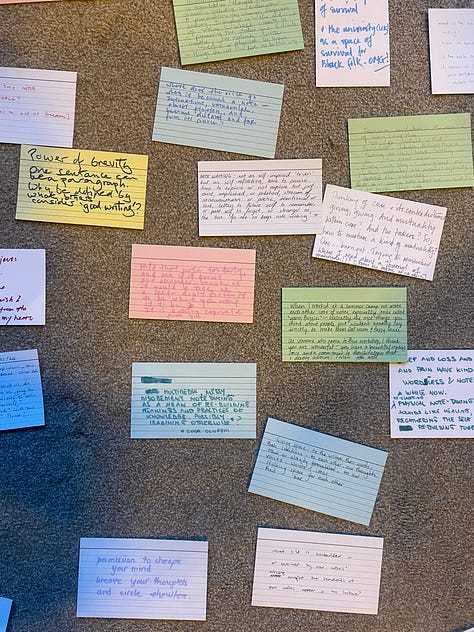
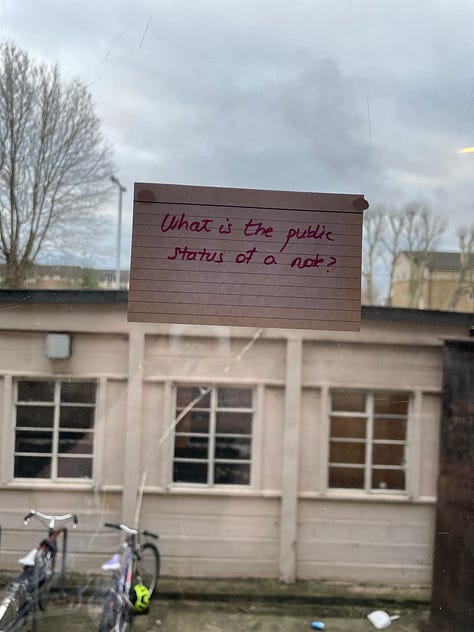
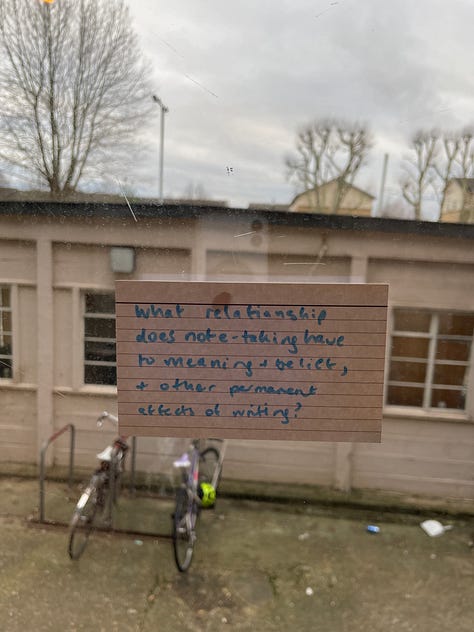
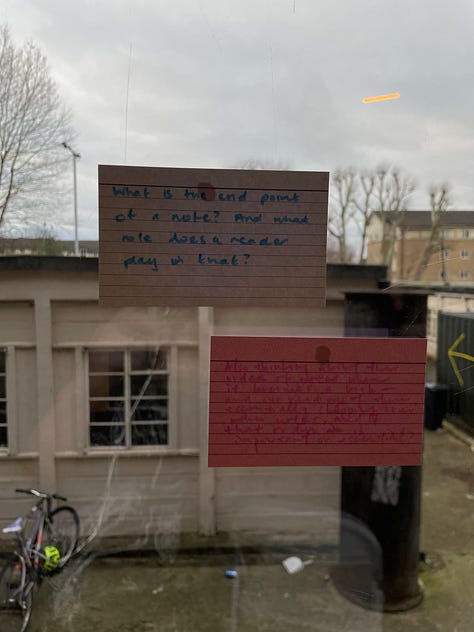
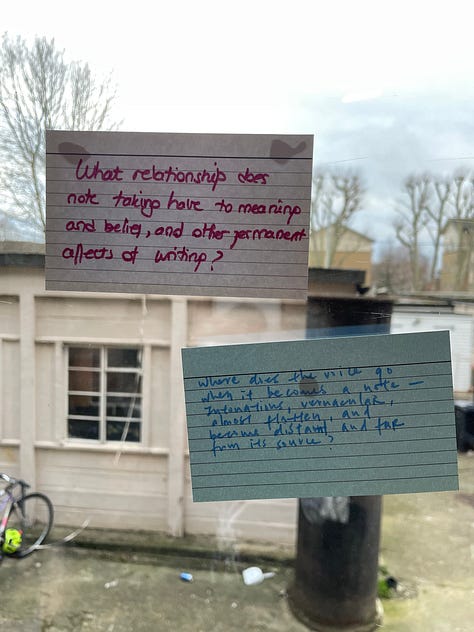
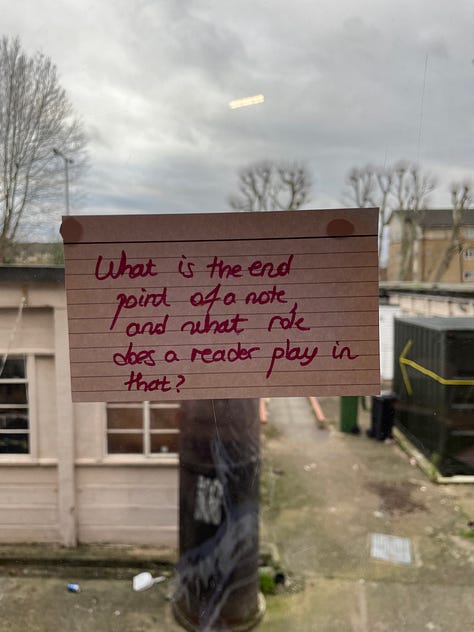
Notes can be seen as a kind of ‘in-between’ stage of thinking and communication. To me, placing value on notes means placing value on a less polished type of writing and knowledge making; it means acknowledging unfinished or inarticulate musings, that may or may not have something important or new to say. It is a type of writing that says I was here while refusing the tendencies of perfection and the hierarchies of ‘what makes good writing’.
In feminist and decolonial knowledge production, there is an emphasis on moving away from hierarchical, western knowledge systems in favour of alternative sources, histories and methodologies. Honouring the idea of the note is a feminist act in the sense that it rejects binary ideas of valuable VS invaluable writing, gives space for ordinary life and the seemingly mundane or insignificant, and puts emphasis on personal positioning and experience rather than an objective analytical viewpoint. Notes are by nature situated, embodied and felt forms of writing, partly because they take on an aliveness and motion of their own.
Similar to letters, notes are nomadic by nature. Due to their briefness, notes are easily shared, exchanged, and redeposited. As a result, their meaning is always subject to change, based on when, where and who they are being read by.
I encountered an example of the nomadic nature of notes at another reading group I attended last year. This reading group, called ‘Up Close,’ was organised around various themes and trends in contemporary dating and romance. On this particular day, the topic was ‘Sexual Healing,’ focusing on the growing interest in couples' therapy as a form of entertainment (think Esther Perel’s ‘Where Should We Begin?’ podcast or the BBC programme ‘Couples’ Therapy’).
As an introductory task, we were told to write down one question we would ask a therapist if given the chance. We then swapped our notes with others in the room and took turns reading the other person’s question aloud to the rest of the group.
My own response to the task was unserious. Unsure whether or not we would have to share our answers with the rest of the group, I scribbled an avoidant-type question: ‘What should I do with my life?’ I’m a very emotional girl and there are a hundred vulnerable questions I could have chosen to write! But in the potential publicness of the act, I closed off and chose an attempt to be witty and present myself as shamelessly-lost rather than honest. I find this situation funny, because despite my efforts, I still ended up being faced with a vulnerable question. I received a note written by a stranger that read: ‘Why don’t I know how to recognise what love feels like?’
The note I received forced me to face a big question that I can deeply relate to but hadn’t yet articulated in this way. There is a unique value in this message, given that it came from a stranger, serendipitously. The message took on a new life form as a physical note I now possess and a question I was forced to ask, offered by an unknown person. I don’t know how the person who wrote this relates to this question, and I don’t know anything about their life experiences that led them to feel this way. But I am now, through this note, in some kind of relation to them.
I have kept this note folded away in my bathroom cupboard for the past year and a half, always returning to the words as something I must work through. I forget it's there, then come across it while searching for a hair bobble or a spare tube of toothpaste. The note keeps coming back to me, it chooses when to ask me this question rather than me choosing when to read it.
Although I don’t know where my little note/agony aunt inquiry/mini love letter came from, I am thankful to her birth mother and creator! By scribbling down her personal vulnerability on this torn up bit of paper at London’s ICA on a random Tuesday night, the stranger has unknowingly pointed me towards something that may have otherwise gone unaddressed for longer.
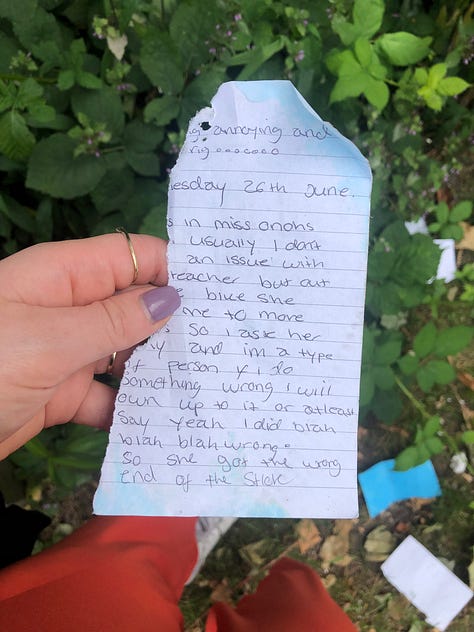
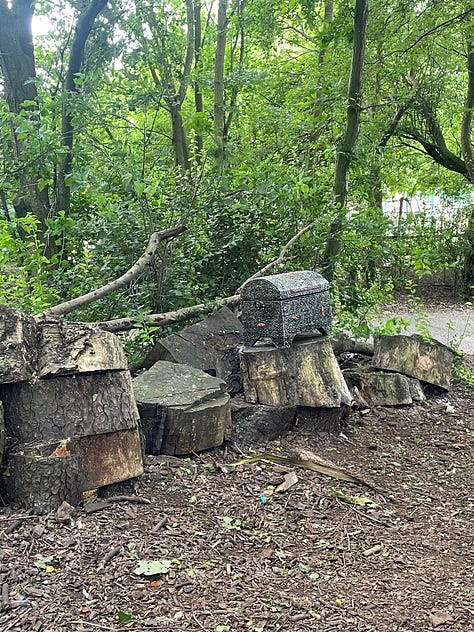
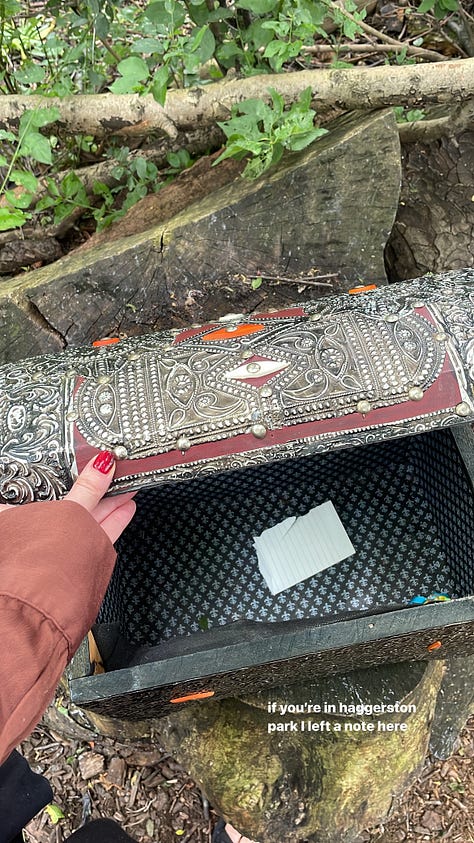
Notes are special because of the unique thinking process they encourage but also in their material form. They open up and expand thinking in times of impasse and silence, they transcend, cross, sneak and borrow. Notes move in their physical positioning, move in their meaning and move thinking in part because they do not require or demand any finality.
In a time that lacks stability, where many of us often feel rootless or unsettled, notes represent some of the small yet significant things worth holding onto, things that are within our ability to possess and nurture.
An appreciation of and commitment to note writing is a commitment to random instances of connection with friends and strangers, spontaneousness, joy, creativity, imagination, vulnerability, silliness and writing as a tool for connection. Embracing the art of note writing is a celebration of human connection and creativity, ensuring that the tactile and personal touch of written words endures in our highly digital age.

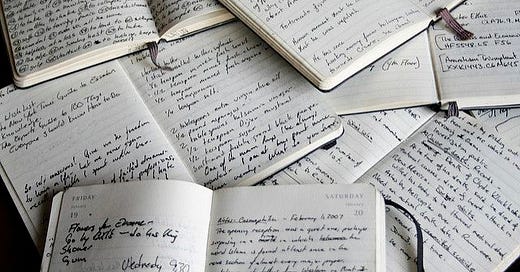



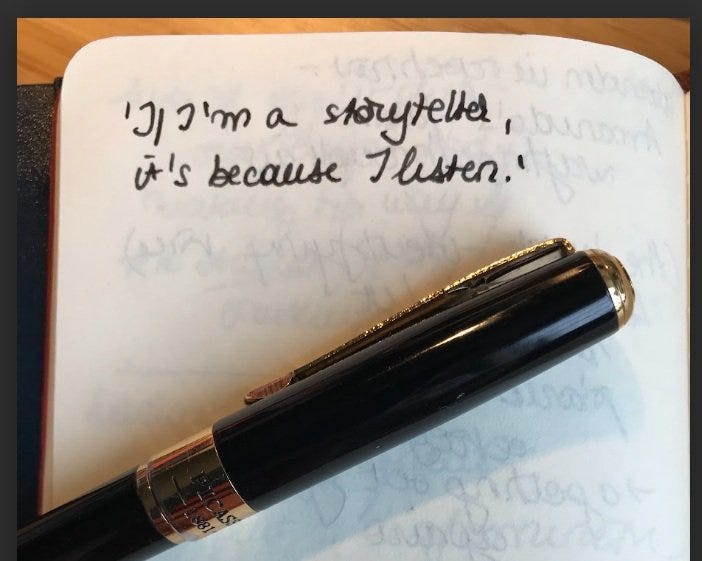
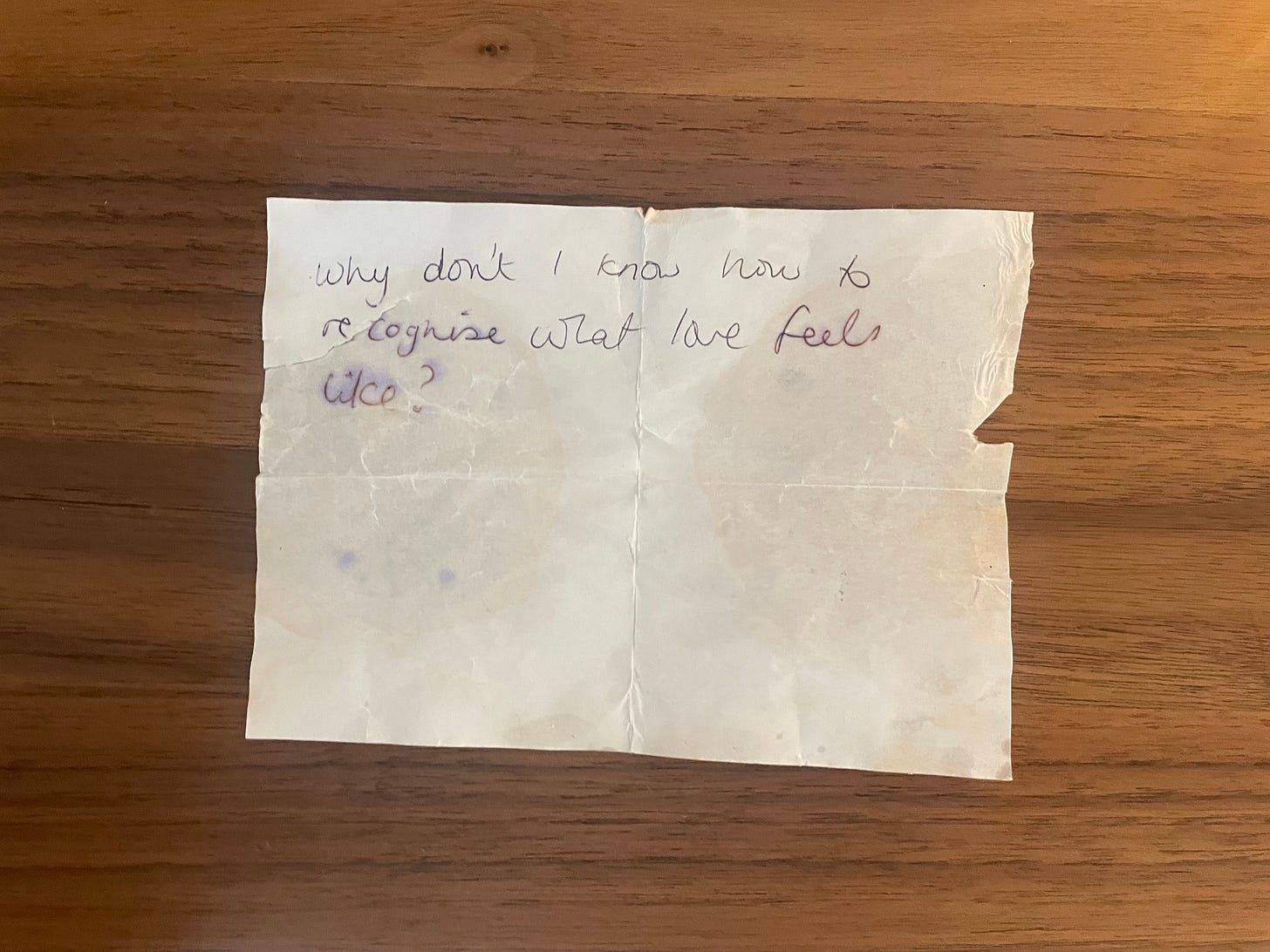
Notes ARE special and unique and made me realise if I could life-hop like the protagonist in 'Midnight Library' I would leave notes to my alternative-selves. It would make total sense, just like when I find one of my old notes and I wonder what was I trying to remember.
okay taylor!!!! this was incredible. i love this deep dive into note taking, it's such an intimate and imperfect thing that i think we should definitely treasure more. i loved your thoughts on this wow write a book I'm now officially waiting